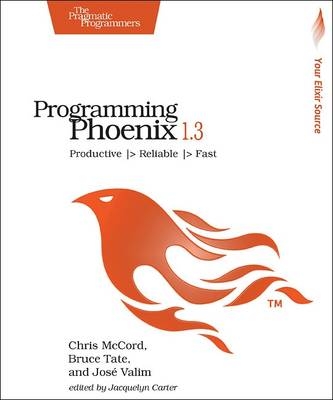
Programming Phoenix 1.4
Productive |> Reliable |> Fast
Seiten
2019
Pragmatic Bookshelf (Verlag)
978-1-68050-226-8 (ISBN)
Pragmatic Bookshelf (Verlag)
978-1-68050-226-8 (ISBN)
Don't accept the compromise between fast and beautiful: you can have it all. Phoenix creator Chris McCord, Elixir creator Jose Valim, and award-winning author Bruce Tate walk you through building an application that's fast and reliable. At every step, you'll learn from the Phoenix creators not just what to do, but why. Packed with insider insights and completely updated for Phoenix 1.4, this definitive guide will be your constant companion in your journey from Phoenix novice to expert, as you build the next generation of web applications.
Phoenix is the long-awaited web framework based on Elixir, the highly concurrent language that combines a beautiful syntax with rich metaprogramming. The best way to learn Phoenix is to code, and you'll get to attack some interesting problems. Start working with controllers, views, and templates within the first few pages. Build an in-memory context, and then back it with an Ecto database layer, complete with changesets and constraints that keep readers informed and your database integrity intact. Craft your own interactive application based on the channels API for the real-time applications that this ecosystem made famous. Write your own authentication plugs, and use the OTP layer for supervised services. Organize code with modular umbrella projects.
This edition is fully updated for Phoenix 1.4, with a new chapter on using Channel Presence to find out who's connected, even on a distributed application. Use the new generators and the new ExUnit features to organize tests and make Ecto tests concurrent.
This is a book by developers and for developers, and we know how to help you ramp up quickly. Any book can tell you what to do. When you've finished this one, you'll also know why to do it.
What You Need:
To work through this book, you will need a computer capable of running Erlang 18 or higher, Elixir 1.5 or higher, and Phoenix 1.4 or higher. A rudimentary knowledge of Elixir is also highly recommended.
Phoenix is the long-awaited web framework based on Elixir, the highly concurrent language that combines a beautiful syntax with rich metaprogramming. The best way to learn Phoenix is to code, and you'll get to attack some interesting problems. Start working with controllers, views, and templates within the first few pages. Build an in-memory context, and then back it with an Ecto database layer, complete with changesets and constraints that keep readers informed and your database integrity intact. Craft your own interactive application based on the channels API for the real-time applications that this ecosystem made famous. Write your own authentication plugs, and use the OTP layer for supervised services. Organize code with modular umbrella projects.
This edition is fully updated for Phoenix 1.4, with a new chapter on using Channel Presence to find out who's connected, even on a distributed application. Use the new generators and the new ExUnit features to organize tests and make Ecto tests concurrent.
This is a book by developers and for developers, and we know how to help you ramp up quickly. Any book can tell you what to do. When you've finished this one, you'll also know why to do it.
What You Need:
To work through this book, you will need a computer capable of running Erlang 18 or higher, Elixir 1.5 or higher, and Phoenix 1.4 or higher. A rudimentary knowledge of Elixir is also highly recommended.
Chris McCord, the creator of Phoenix, professionally trains new developers for the rising framework and works with teams adapting it.Bruce Tate, the author of many award-winning books and creator of the Seven Languages in Seven Weeks series, is the CTO for icanmakeitbetter.com, which is already running Phoenix in production. Jose Valim, the creator of Elixir and member of the Phoenix core team, is the co-founder and director of research and development at Plataformatec.
| Erscheinungsdatum | 01.10.2019 |
|---|---|
| Verlagsort | Raleigh |
| Sprache | englisch |
| Maße | 150 x 250 mm |
| Gewicht | 666 g |
| Themenwelt | Mathematik / Informatik ► Informatik ► Programmiersprachen / -werkzeuge |
| Mathematik / Informatik ► Informatik ► Web / Internet | |
| ISBN-10 | 1-68050-226-3 / 1680502263 |
| ISBN-13 | 978-1-68050-226-8 / 9781680502268 |
| Zustand | Neuware |
| Haben Sie eine Frage zum Produkt? |
Mehr entdecken
aus dem Bereich
aus dem Bereich
Buch | Hardcover (2012)
Westermann Schulbuchverlag
CHF 44,90
Schulbuch Klassen 7/8 (G9)
Buch | Hardcover (2015)
Klett (Verlag)
CHF 29,90
Buch | Softcover (2004)
Cornelsen Verlag
CHF 23,90


